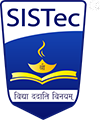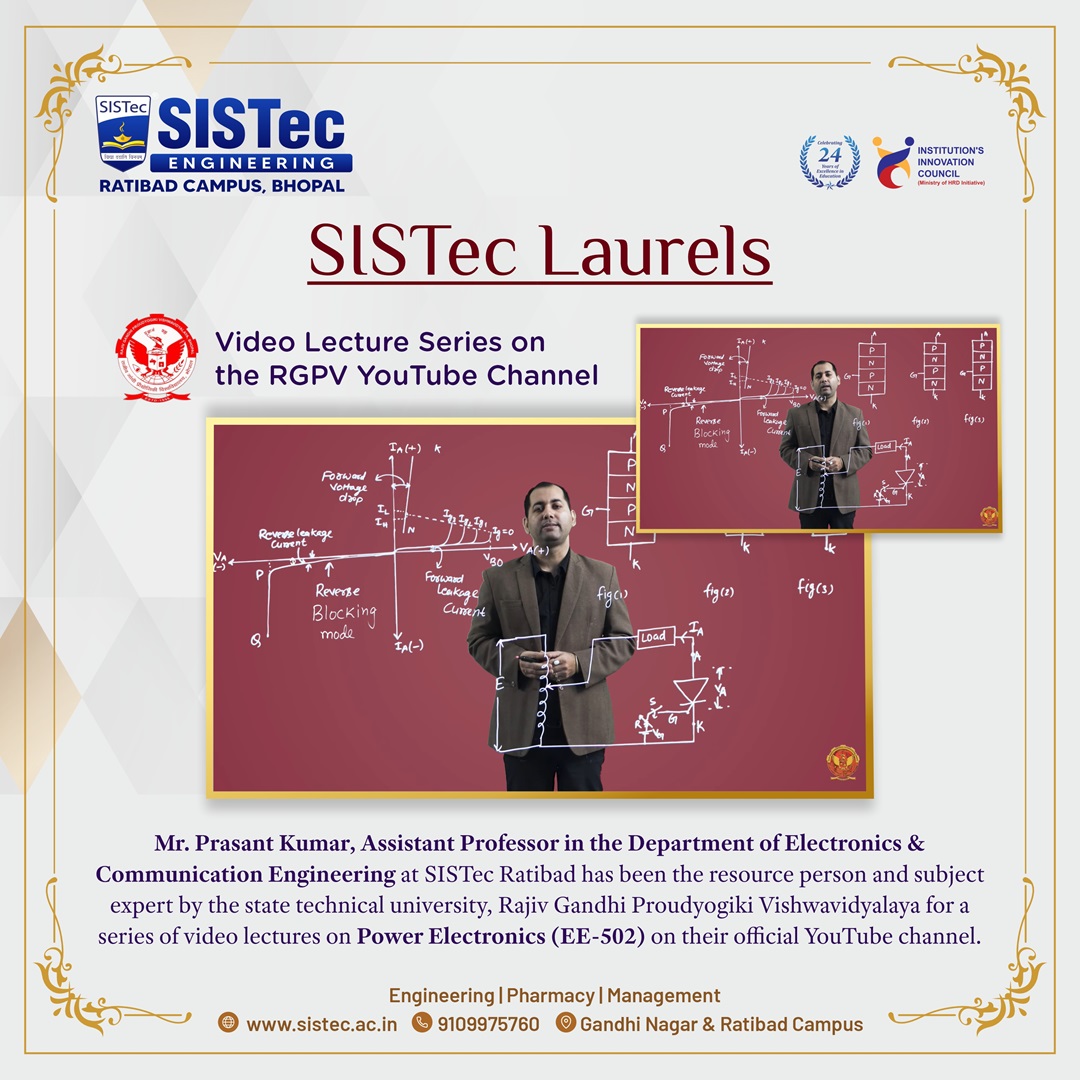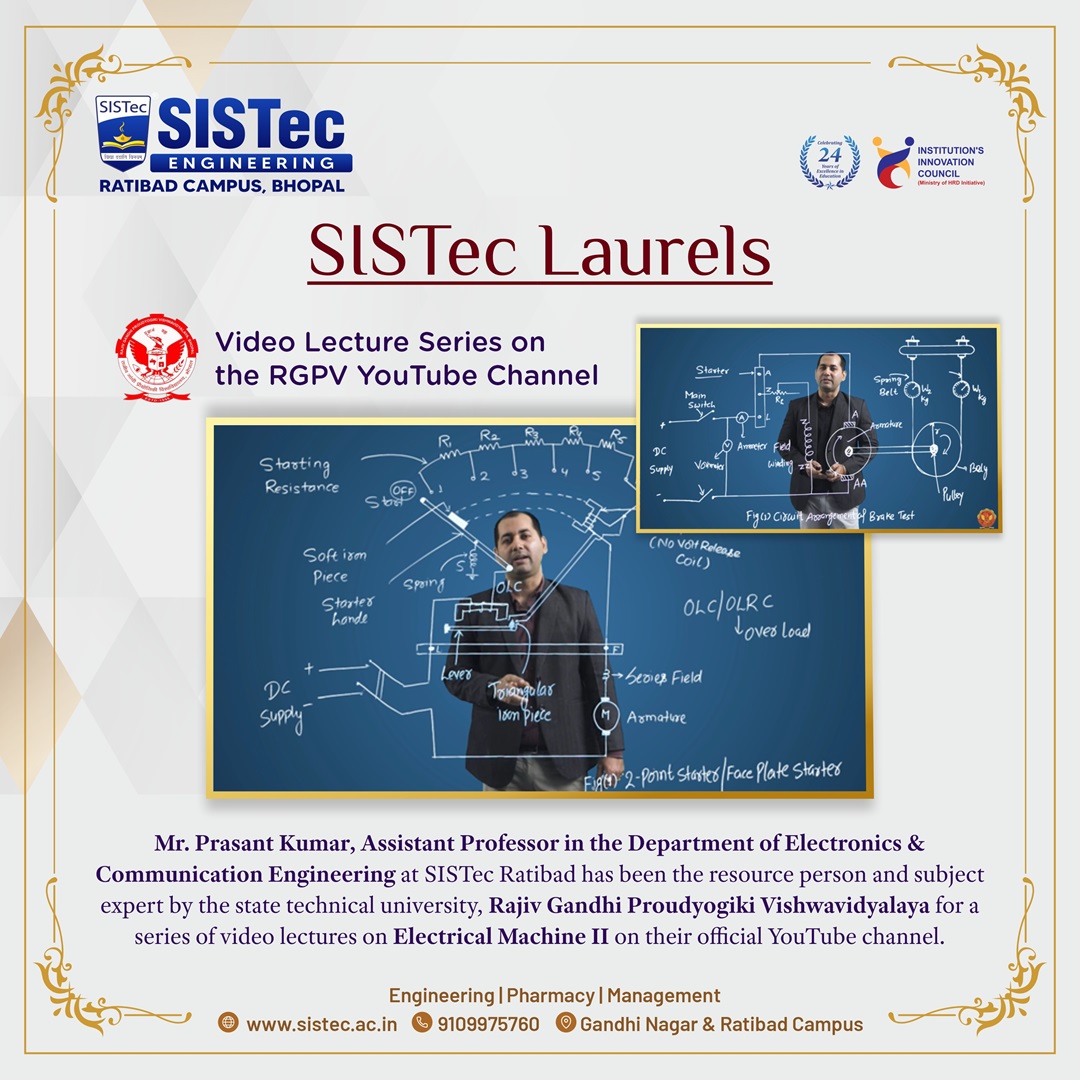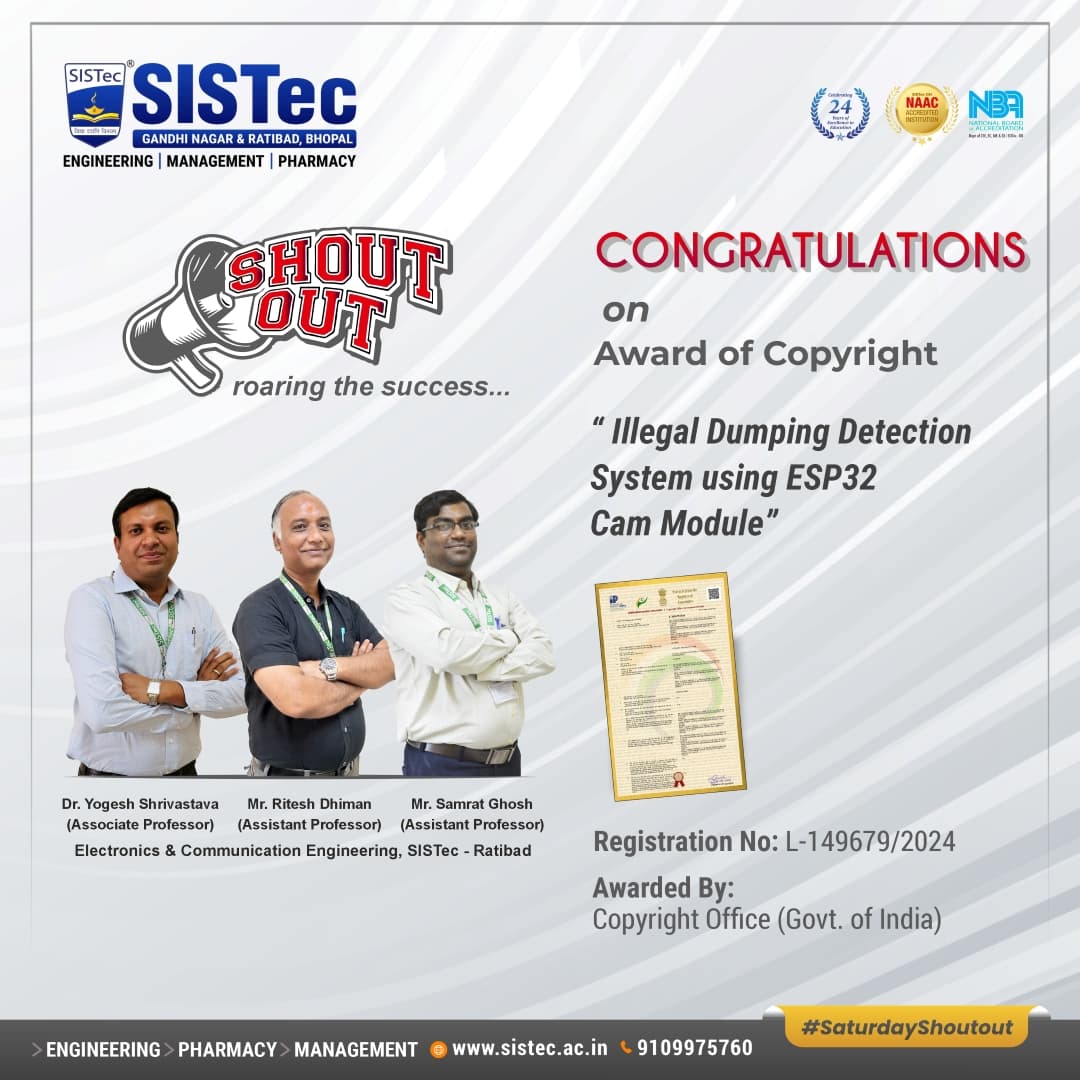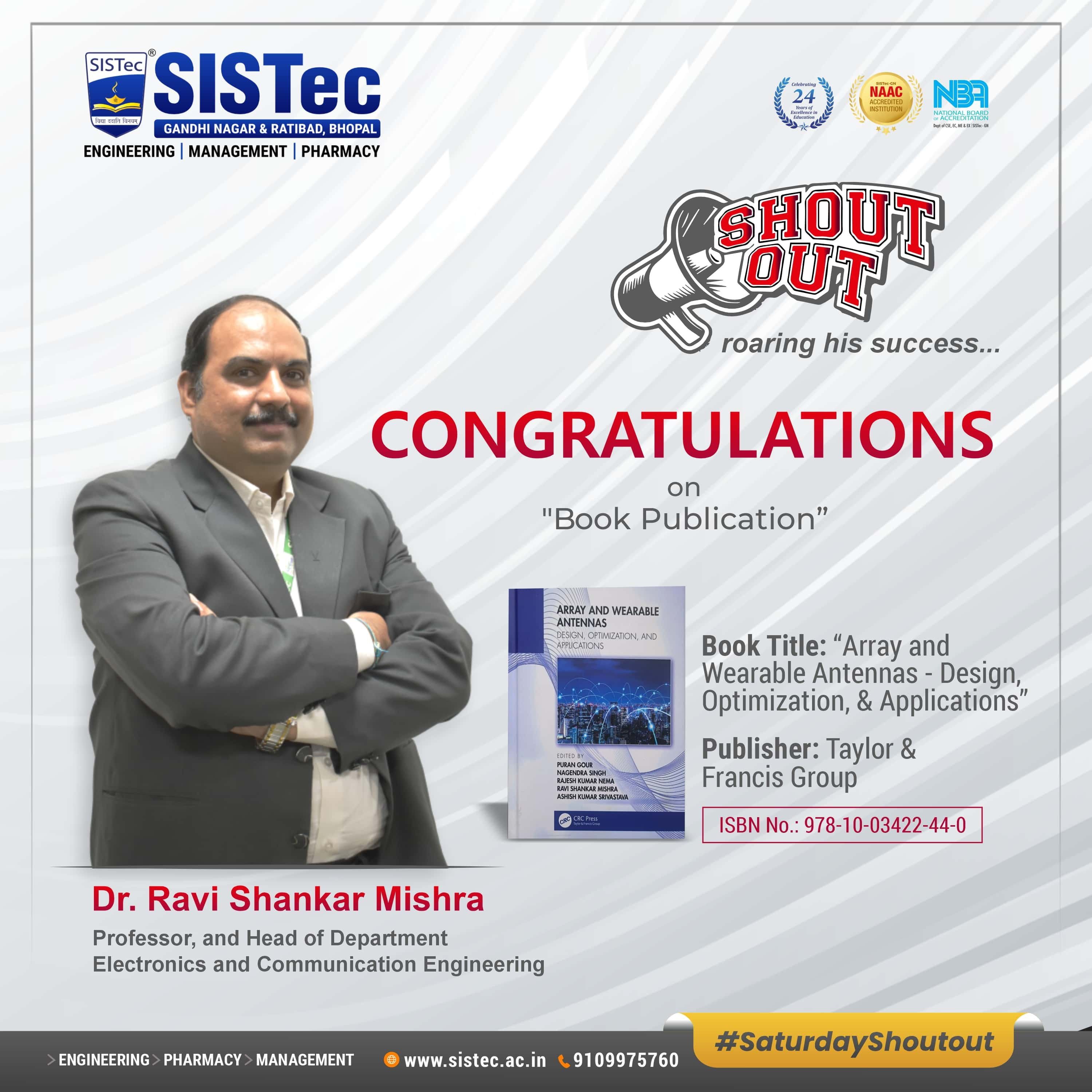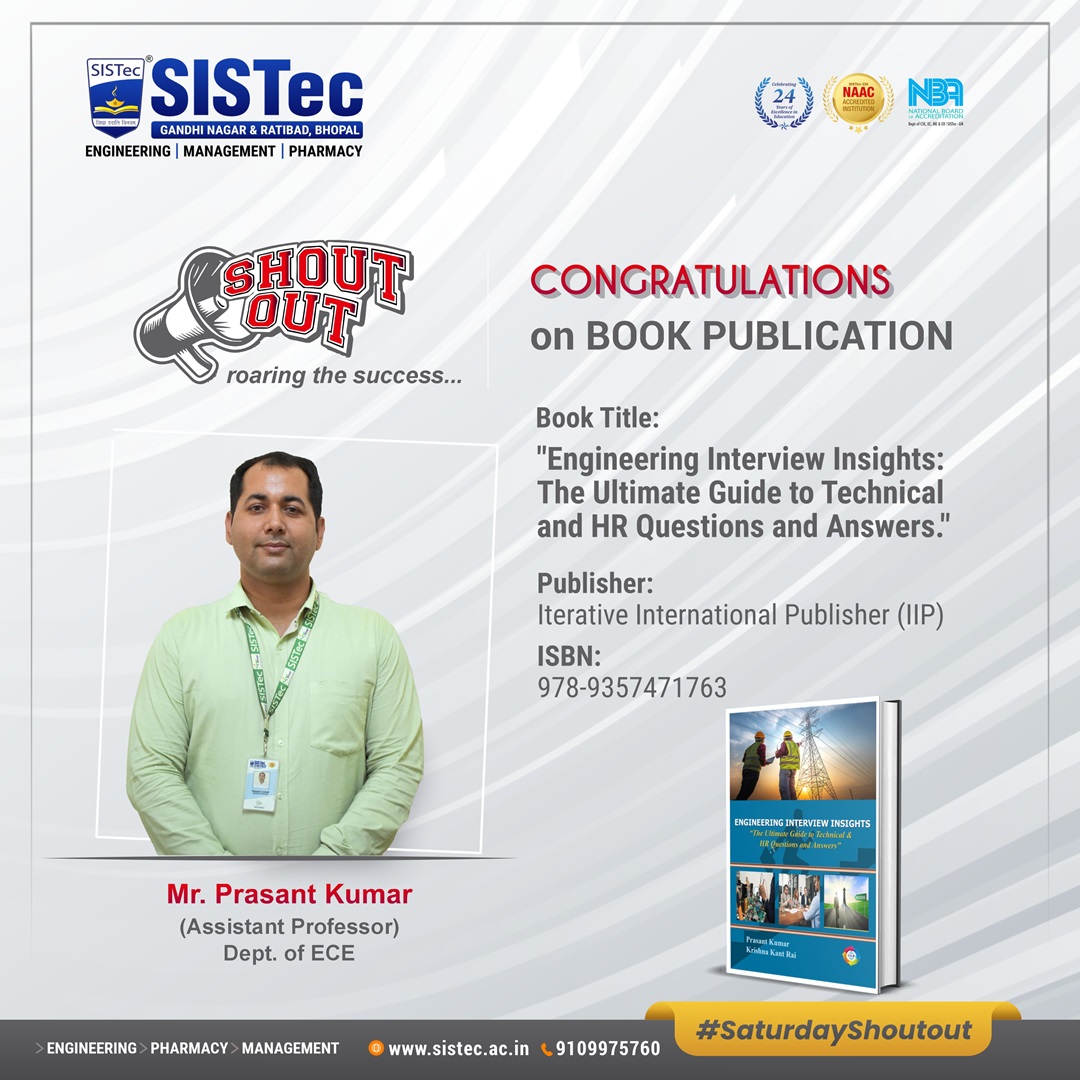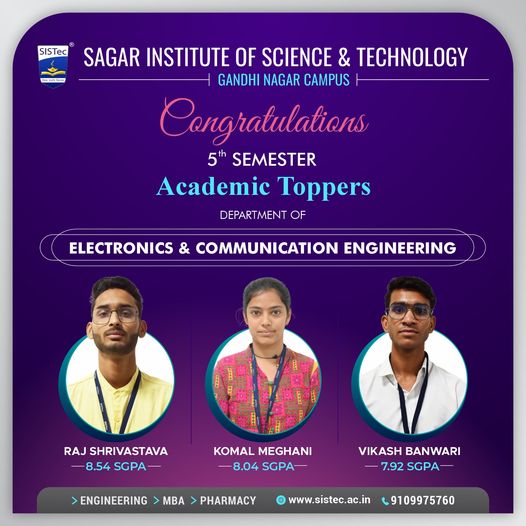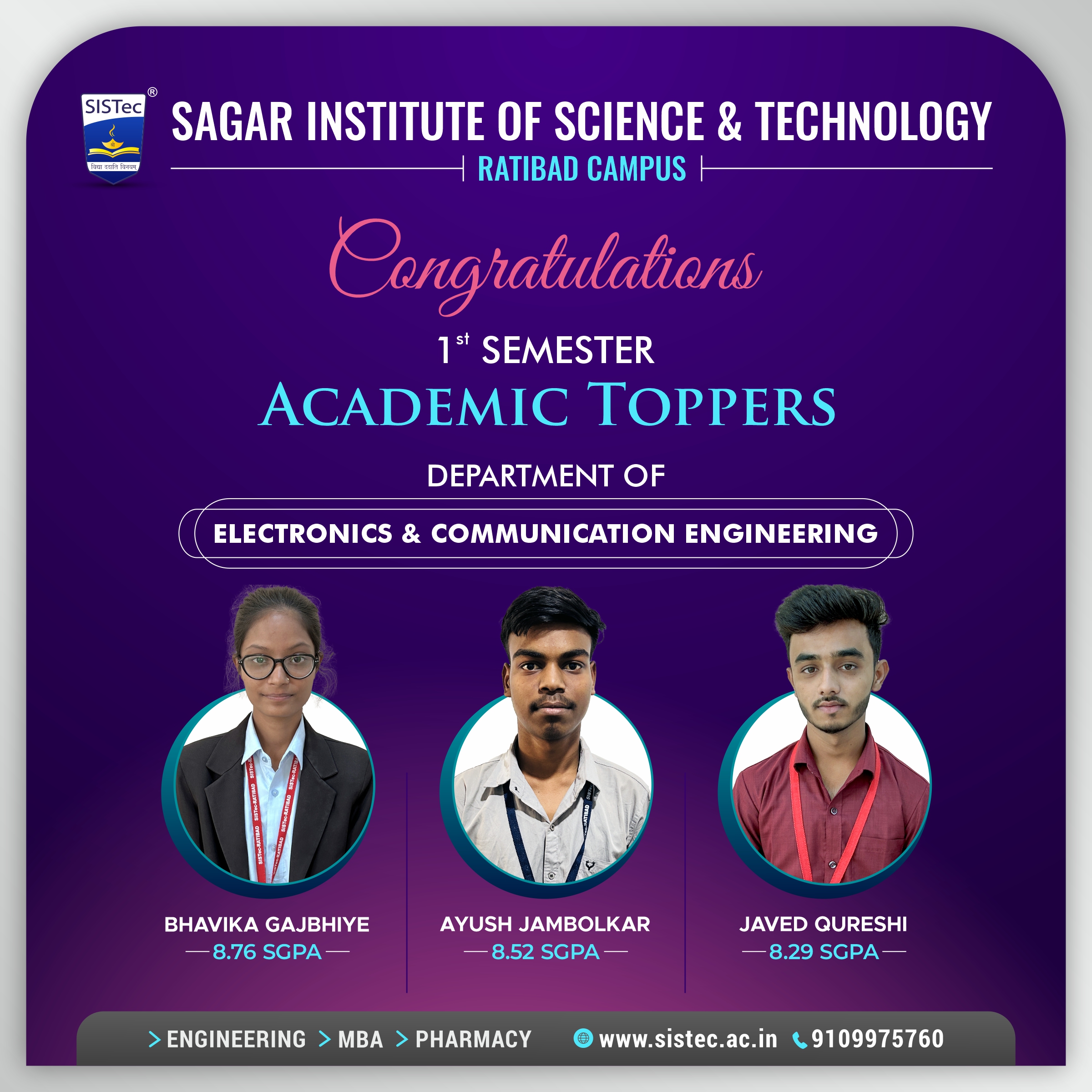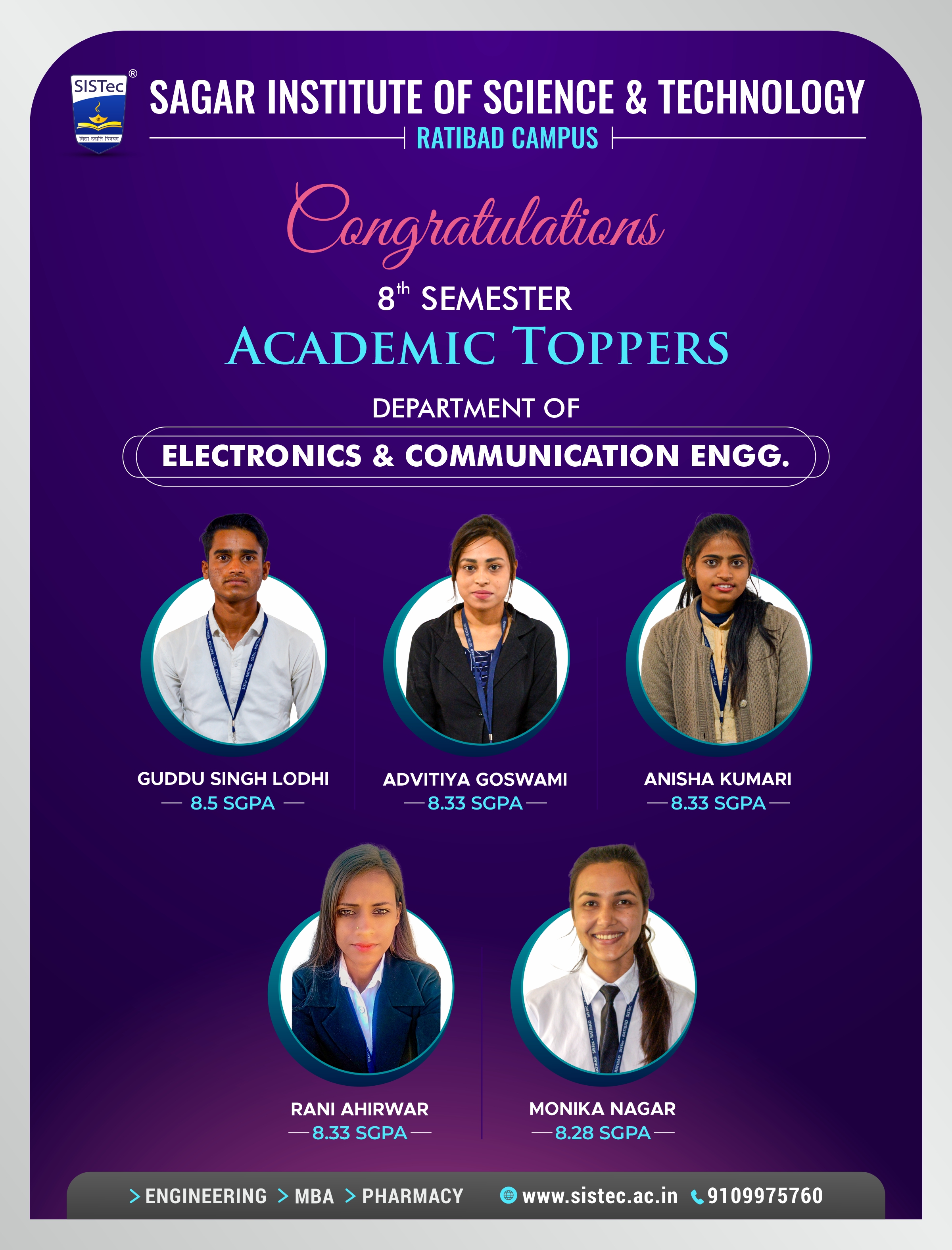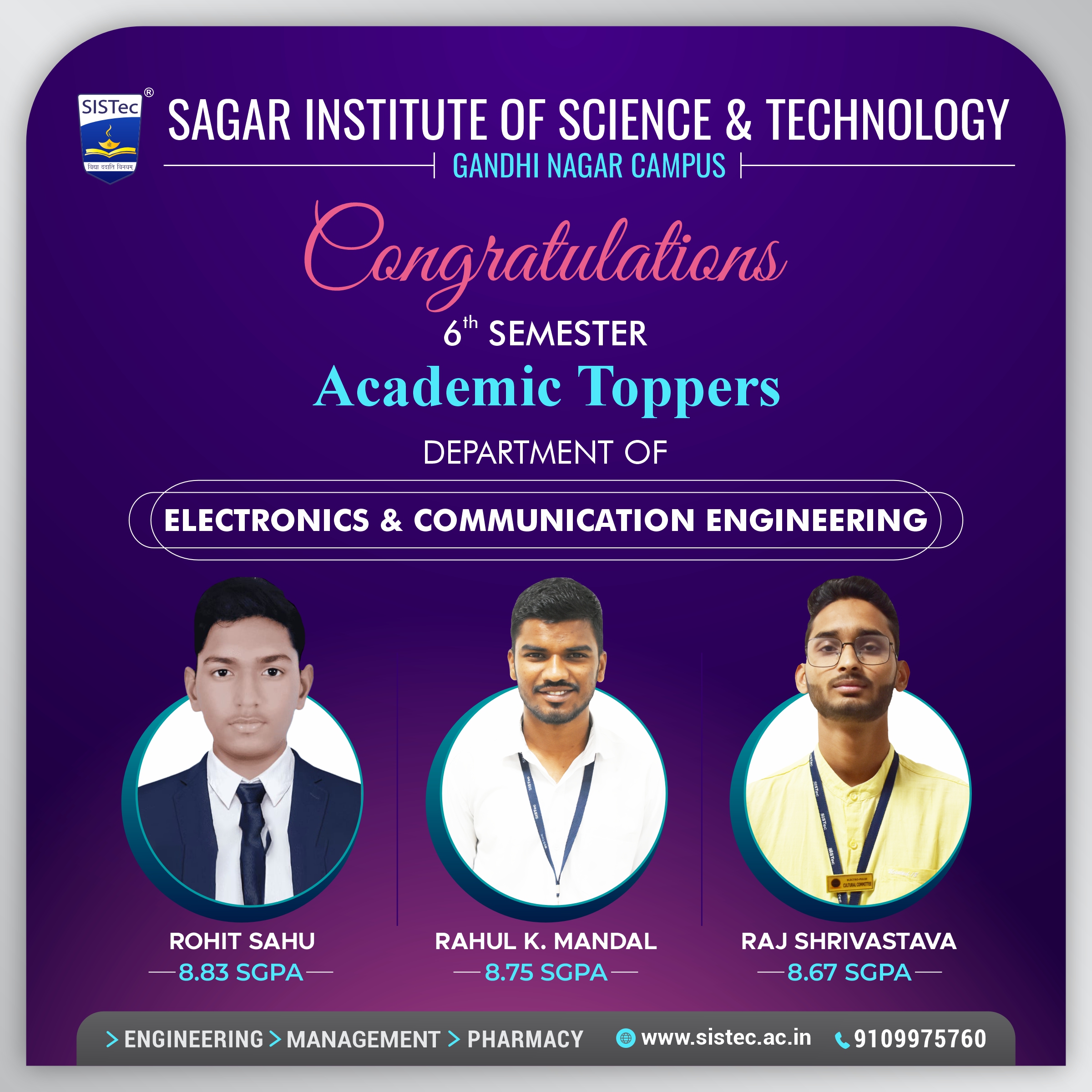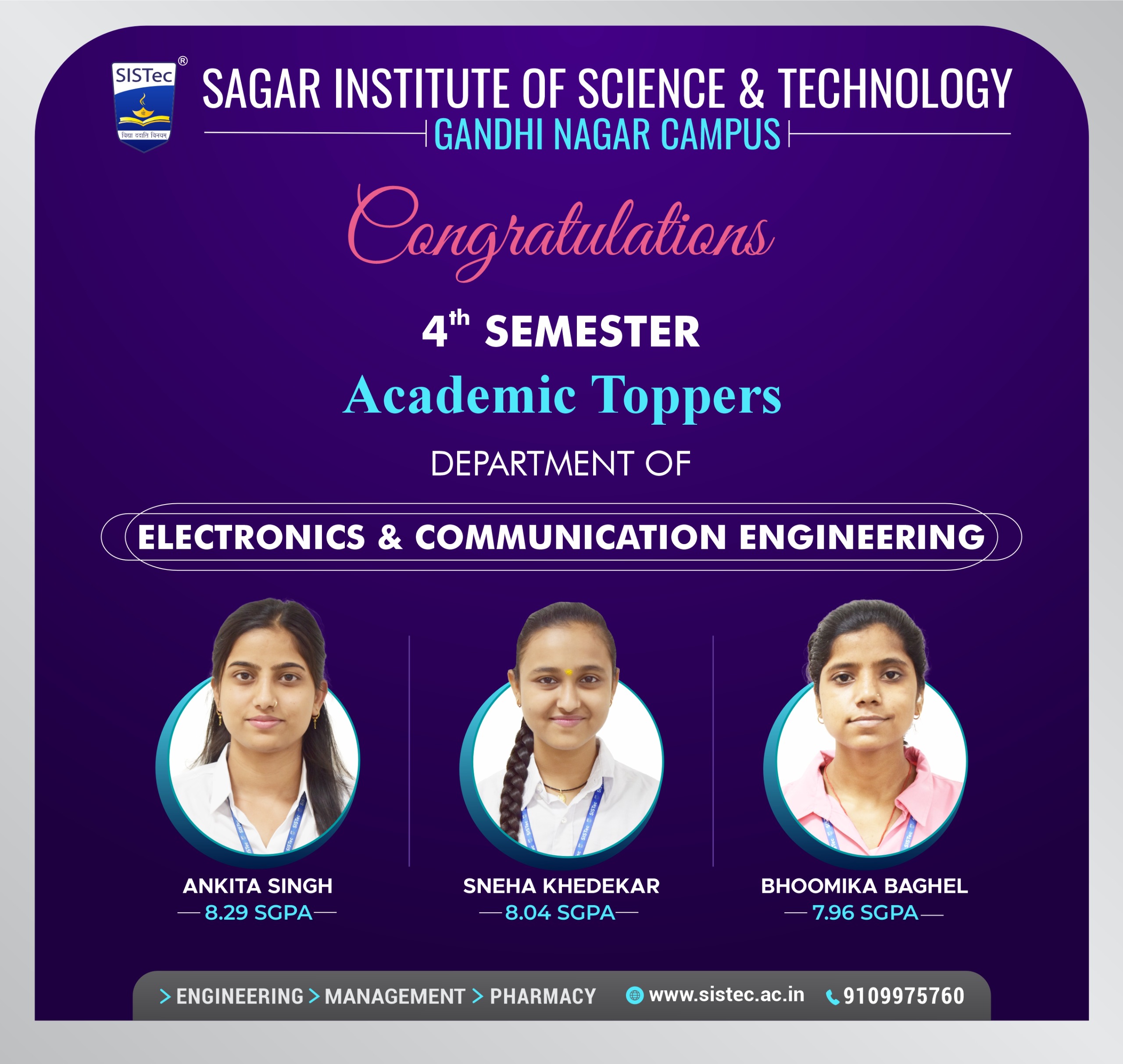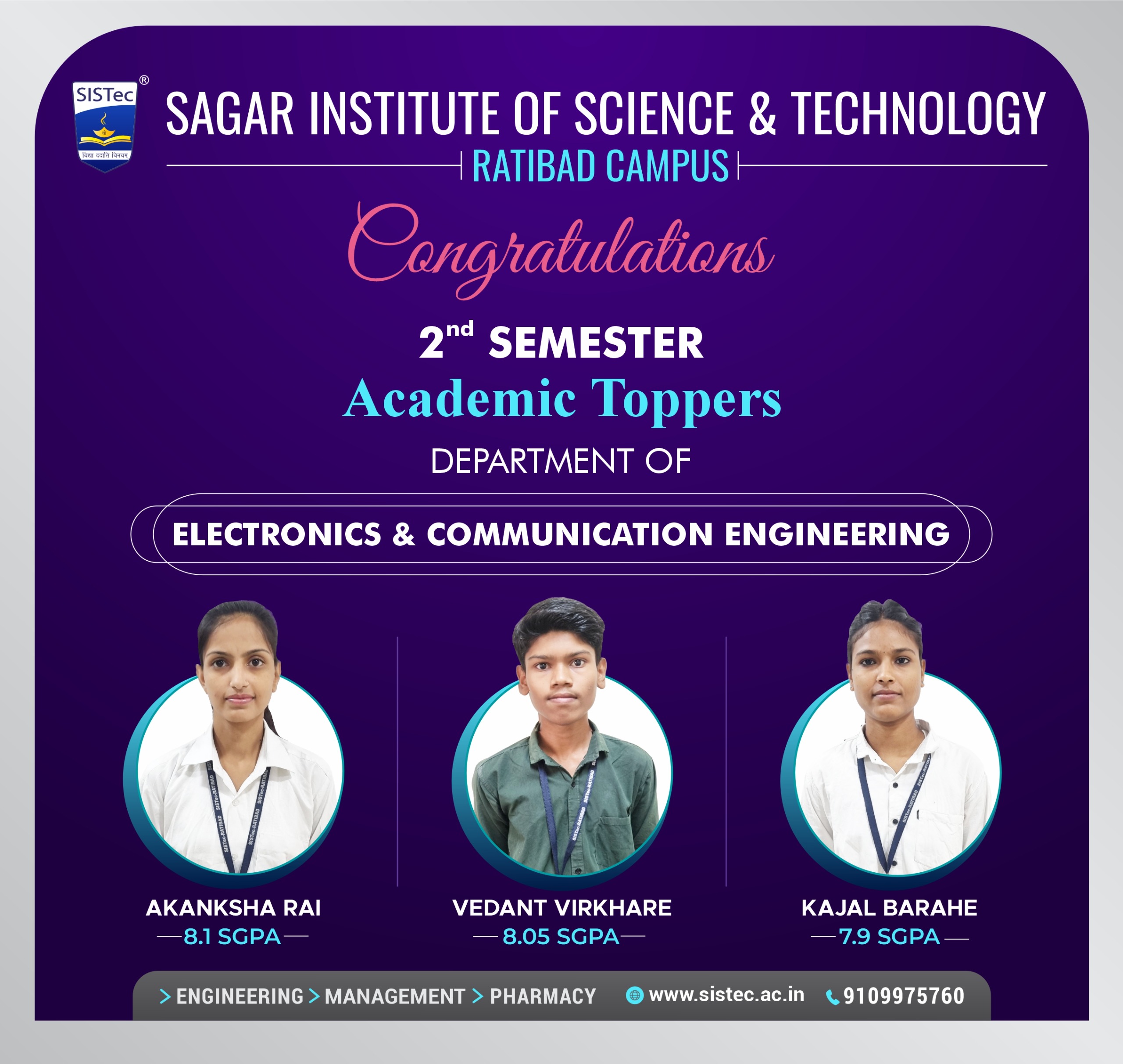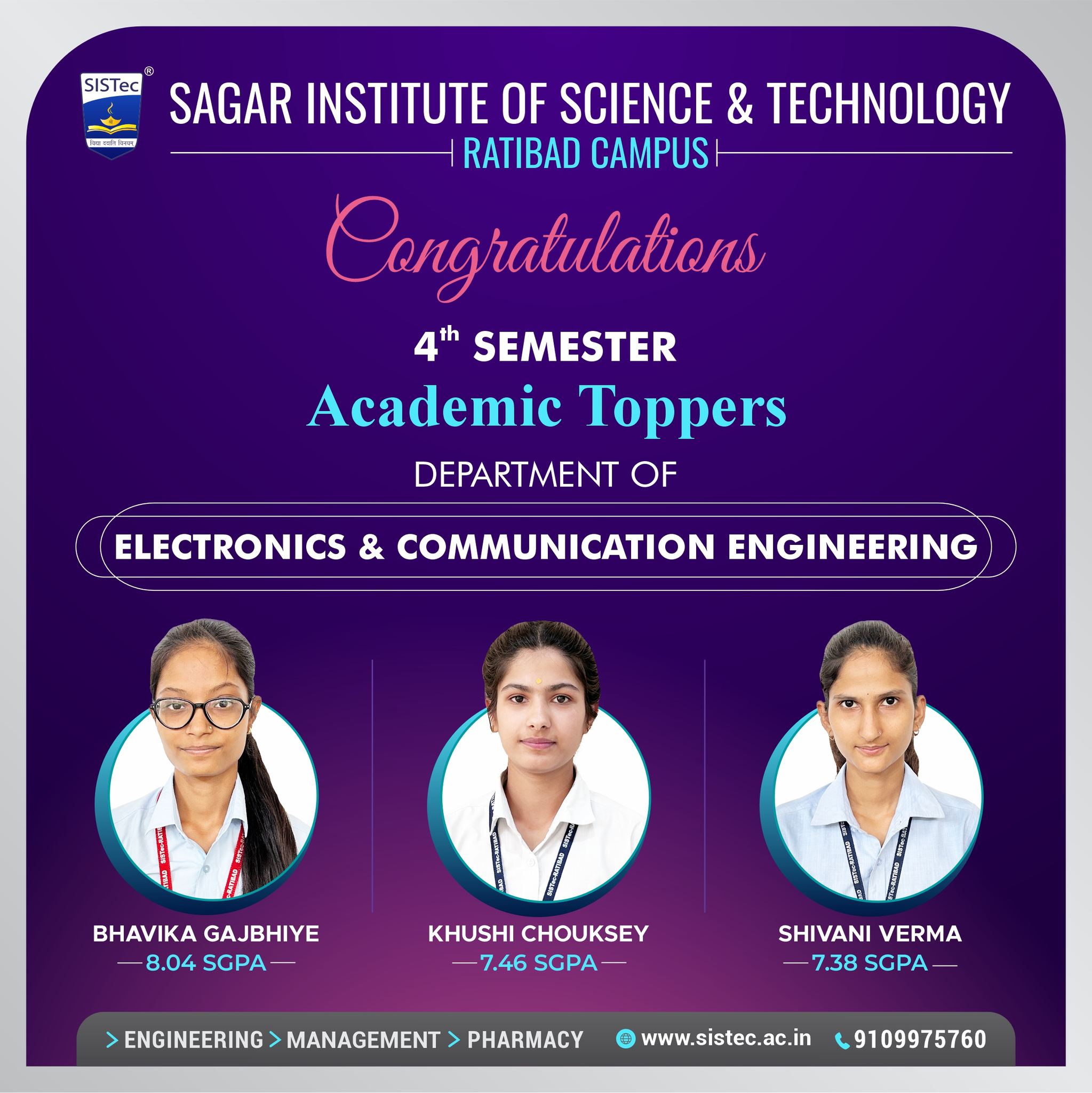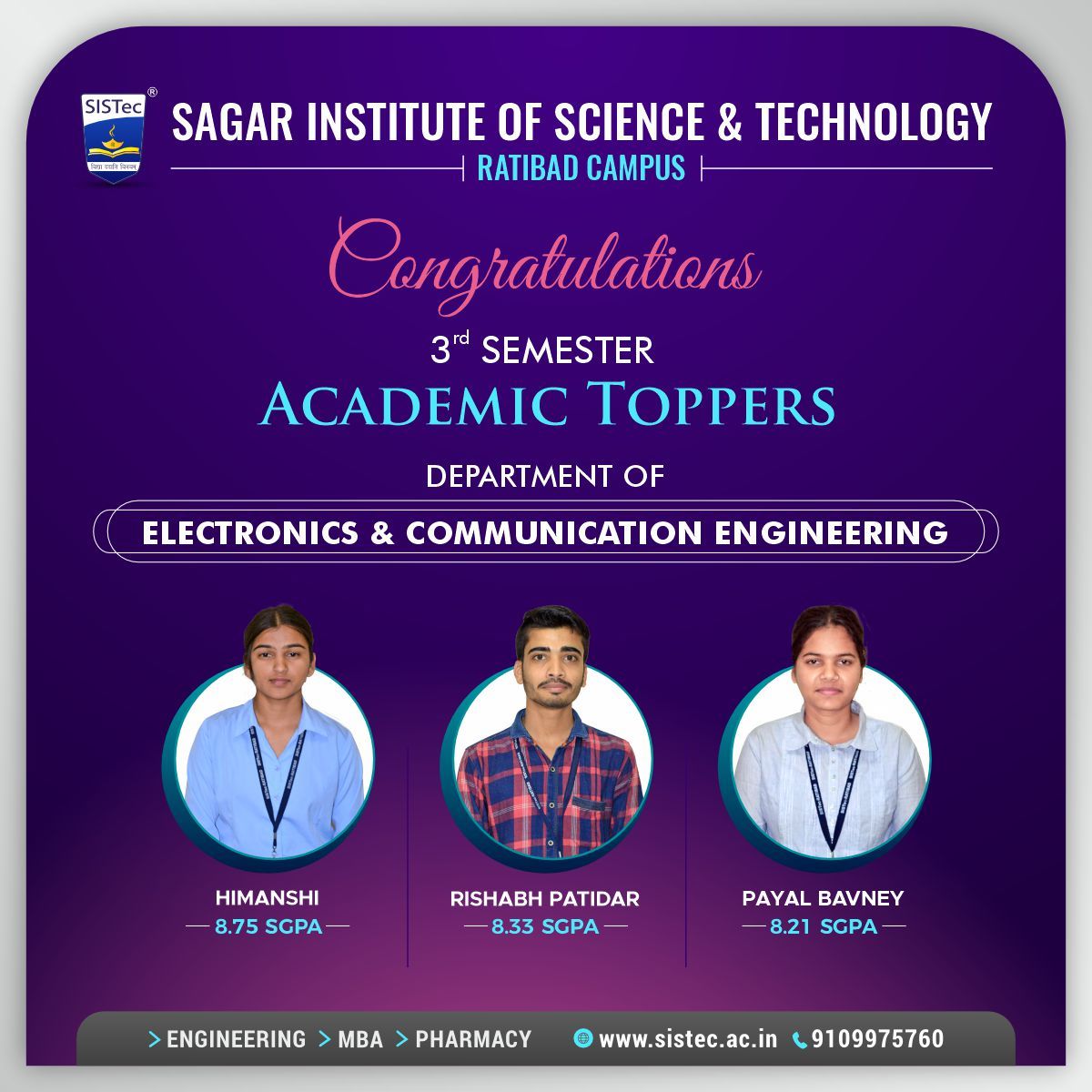Department of Electronics & Communication Engineering
| Seats Availability | ||||
|---|---|---|---|---|
| Program | Intake (SISTec) | Intake (SISTec-R) | Intake (SISTec-E) | Total Number of Seats |
| B.Tech. | 60 | 60 | 60 | 180 |
| M.Tech. | 36 | - | - | 36 |
Technical Trainings Roadmap
-
1 st
Odd Semester Training Module
Refresher Course Programming with C upto Loops
-
1 st
Winter Break Training Module
C Programming
-
2 nd
Even Semester Module + Subject
Programming Using C++ (BCE)
-
3 rd
Summer Break Training Module
Electro Inspection
-
3 rd
Odd Semester Training Module
Analysis & Design of Analog & Digital Circuits
-
4 th
Winter Break Training Module
Data Structure using C Programming (CSE Dept.)
-
4 th
Even Semester Training Module
MATLAB & VHDL
-
5 th
Summer Break Training Module
Programming Using Python (CSE Dept.)
-
5 th
Odd Semester Training Module
Embedded Systems
-
6 th
Winter Break Training Module
Web Development using HTML/CSS/JS/PHP (CSE Dept.)
-
6 th
Even Semester Module + Subject
IoT & Robotics
-
7 th
Summer Break Training Module
Placement Oriented Training
-
7 th
Odd Semester Training Module
Company Specific Trainings
-
8 th
Winter Break Training Module
Company Specific Trainings
B.Tech in Electronics & Communication Engineering
Electronics and Communications Engineering (ECE) is the engineering stream involved in the research, design, development, and testing of electronic equipment used in various electric systems. This stream of engineering mainly deals with analog transmissions, basic electronics, microprocessors, digital and analog communication, integrated circuits, microwave engineering, satellite communications, antennae, and wave progressions.
The ECE department at SISTec offers B.Tech and M.Tech course programs in Electronics & Communication Engineering with a focus on the latest trends and technology training so that our budding engineers can prove themselves outside in the corporate world. The department works with an end focus on reducing industry and institute gaps, thus special attention is given to subjects like Electronic Devices / Microprocessor / VLSI / TV and Mobile Communications.
PCB Designing, Embedded, VLSI, JAVA, Web Page Designing, IoT, Robotics Design, Industrial VLSI Design, and Arduino modules are certain extra training given to students apart from the regular curriculum. The department also has an e-yantra Robotics Lab sponsored by MHRD through the National Mission of Education - ICT in collaboration with IIT Bombay. Students have also prepared projects in the laboratories under the guidance of faculties. Smart Lecture Monitoring System using Arduino, Online Book Tracking System, Message Display using Bluetooth, Talking Gloves, and Smart Parking System are a few of the advanced projects made.
The department has experienced and dedicated faculties with a strong commitment to engineering education maintaining its streak to be on a growing path. Faculties have published their research work in reputed journals/conferences. Because of the Digital India initiative by the Indian Government and the subsequent enhancement of electronic chip technology, the department of ECE is committed to providing in-depth theoretical knowledge and skilled practical training in these emerging fields of Electronics & Communication Engineering. The department’s main focus is on the overall practical exposure to the students on various aspects of Electronics and Communication Engineering. Frequent industrial visits and project-based assignments are some of the departmental incessant activities.
M.Tech in Digital Communication
M.Tech. in Digital Communication is a program that focuses on the development, use, critical evaluation, and regulation of new electronic communication technologies using computer applications; and that prepares individuals to function as developers and managers of digital communications media. It includes instructions in computer and telecommunications technologies and processes; design and development of digital communications; marketing and distribution; digital communications regulation, law, and policy; the study of human interaction with, and use of, digital media; and emerging trends and issues.
The M.Tech course of Digital Communication aims at providing in-depth knowledge to students of Electronics and Telecommunication background in various subjects of present-day interest like Advanced Digital Communication. The program aims to provide students with a wide variety of opportunities in Research and Development (R&D) and industry experience.
Modern DSP, Advanced Embedded System, Antenna Theory and Design, Digital Electronics, Error control and coding, Advanced Computer Architecture, along with a course on Linear Algebra and elective courses like CMOS VLSI Design, Wireless & Mobile Network, Advances in VLSI design, Real-Time Operating System are some of the options to select for students according to subjects of their interest.
M.Tech in Very Large-Scale Integration (VLSI) Design
Very Large-Scale Integration Design or VLSI Design is based on current industry standards that help attendees to secure placements in their dream jobs. VLSI Design course involves "Learning by Doing" using state-of-the-art infrastructure for performing hands-on exercises and real-world simulations. This extensive hands-on experience in VLSI Designing training ensures that you absorb the knowledge and skills that you will need to apply at work after your placement in an MNC.
The M.Tech in VLSI is a 2-years Masters's Degree Programme for students interested in the current and expanding field of VLSI circuit design, to equip students with detailed knowledge of the latest technologies and the skills required to apply this knowledge in the design of VLSI systems. This program is designed to prepare students for leading-edge positions in the industry in the areas of VLSI. The program covers engineering aspects in designing and developing IC-based systems.
The program curriculum is aimed at VLSI System Design: Hardware description Languages, System Architectures, Physical designs, Verification techniques, Simulation & Synthesis, Low power design techniques, Mixed-mode design methodologies, and Embedded System Design: Advanced Embedded Microcontrollers, Real-Time Embedded Systems, Advanced Embedded System Design, and System on Chip.




